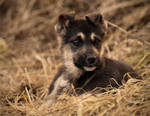Собака на сене
Russians love their proverbs and pithy sayings. It is amazing how many of them we have and use excessively to express so many different emotions. It seems that we have one for every life situation. We love them almost as much as we do our swear words ![]() (Honestly, I once heard a guy speak using just swear words! Quite an experience, I might add…)
(Honestly, I once heard a guy speak using just swear words! Quite an experience, I might add…)
 «Собака на сене» is one of the very neat expressions we use. It is translated as “dog on hay”. The full saying goes: «собака на сене: и сама не ест, и другим не даёт», “dog on hay: she neither eats it herself, nor lets the others”. It is used when someone does not do something simply out of spite or uses something that others want just so they will not get it.
«Собака на сене» is one of the very neat expressions we use. It is translated as “dog on hay”. The full saying goes: «собака на сене: и сама не ест, и другим не даёт», “dog on hay: she neither eats it herself, nor lets the others”. It is used when someone does not do something simply out of spite or uses something that others want just so they will not get it.
| Она - как собака на сене: она не любит его, но не дает ему найти другую. | “She is like a 'dog on hay': she does not love him but she will not allow him to find someone else.” |
| Моя жена вегетарианка, поэтому дома мы не едим мясо. Она как собака на сене: и сама не ест, и нам не даёт! | “My wife is a vegetarian; therefore, we do not eat meat at home. She is like a dog on hay: she neither eats it herself, nor lets us!” |
Here is how my kitty demonstrates it: ![]()

| Моя кошка любит спать на крышке унитаза - ну, не собака ли на сене? | “My cat likes to sleep on the toilet cover – she is a regular dog on hay, isn’t she? |
There is a really great play written by Lope De Vega that is called «Собака на сене». There a beautiful duchess falls in love with her secretary. She cannot be with him because of the difference in their social status, but at the same time her jealousy is driving her crazy. She is torn between what her honor dictates her and what her heart yearns for. That makes her act like the dog in the proverb: she does not commit to either being with her love or agree to let him go. It is a beautiful love story with a very happy ending.
This play was staged and made into a movie in 1977 by a talented director, Yan Frid. This adaptation is very popular and much loved in Russia. I would recommend for everyone to see it!
5 comments
The Spanish version (which is the original title of Lope de Vega’s play) is “el perro del hortelano", which could be translated as “the gardener’s watchdog".
The meaning is exactly the same. A dog watching a garden, which wouldn’t eat the vegetables in it, and wouldn’t let anyone else get near them.
In Polish “собака на сене” is the equivalent of “pies ogrodnika” (the gardener’s dog).
Thanks for very instructive and entertaining site!!
Chris
In Brazilian Portuguese there’s an expression, probably originated by the same idea, but a little bit rude.
It’s something like “he/she/it doesn’t f… it, neither gets down from it". ("Não fode, nem sai de cima").
Thank you! That is great to know… I actually have never heard of it before but I looked it up and here it is:
http://www.aesops-fables.org.uk/aesop-fable-the-dog-in-the-manger.htm
We do have a similar phrase in English -"a dog in a manger” A manger is a trough for animals like horses to eat hay in a stable. Jesus was “laid in a manger", too when just born.
The phrase for both languages seems to come from Aesop’s fables.
Love the blog!
Form is loading...